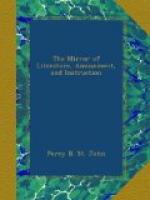“My Lord, your most humble, &c.
“James Howell.”
* * * * *
ILLUMINATED PSALTER.
(For the Mirror.)
There is an illuminated Psalter preserved amongst the MSS. in the British Museum, 2. A. 16., written by John Mallard, Chaplain to Henry VIII., wherein are several notes in that king’s hand writing, some in pencil prefixed to Psalm liii. ("Dixit incipiens.”) According to a very ancient custom are the figures of King David and a fool, in this instance evidently the portraits of Henry and his jester, Will Somers.
S. K.
* * * * *
ANCIENT VALENTINES.
(For the Mirror.)
The earliest poetical Valentines remaining, are those preserved in the works of Charles Duke of Orleans, father to Louis XII. of France. He was taken prisoner at the battle of Agincourt, and remained in England twenty-five years, and called his mistress his Valentine. In the royal library of MSS. now in the British Museum, there is a magnificent volume containing his writings whilst in England; it belonged to Henry VIII. for whom it was copied from older MSS. It is illuminated: one painting represents the duke in the White Tower, at a writing table. This MSS. also contain some of the compositions of Eloisa.
S.K.
* * * * *
THE COSMOPOLITE.
SUPERSTITIONS, FABLES, &C. RELATIVE TO ANIMALS.
(Continued from page 171.)
The fore-foot of a Hare worn constantly in the pocket, is esteemed by certain worthy old dames as a sure preventive of rheumatic disorders.
The Lynx was believed by the ancients, from the acuteness of its sight, to have the power of seeing through stone walls; and amongst other absurdities then gravely maintained were these: that the Elephant had no joints, and being unable to lie down, was obliged to sleep leaning against a tree; that Deer lived several hundred years; that the Badger had the legs of one side shorter than those of the other; that the Chameleon lived entirely on air, and the Salamander in fire; whilst the sphynx, satyr, unicorn, centaur, hypogriff, hydra, dragon, griffin, cockatrice, &c. &c. &c. were either the creations of fancy, or fabled accounts of creatures of whose real form, origin, nature, and qualities, but the most imperfect knowledge was afloat.
The flesh of the Rhinoceros, and almost every part of its body, is reckoned by the ignorant natives of countries where it is found, an antidote against poison.




